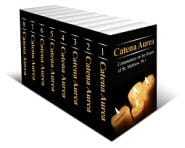The text of this post originated on the Logos Forums. It was written by Rosie Perera, who is a Logos MVP and has great insight on a wide array of topics and issues, both theological and technical. She’s also a friend of mine. Rosie has given me permission to reproduce her forum post here to try to bring some more attention to Community Pricing — a great way to get cheap books — and to highlight one of those presently very, very cheap books that may soon be a bit more expensive: Catena Aurea: Commentary on the Four Gospels by Thomas Aquinas (8 vols). Here’s Rosie:
Now that the George Müller collection is on its way, Catena Aurea is the next great buy in Community Pricing. With current bidding going as it has been, it looks like this gem will be available for $20 or less. We’re getting close to 80% of production cost.
Community Pricing is an awesome way to get works for the least expensive price imaginable. For example, the Müller collection went for $15 in community pricing, and pre-pub is now $79.95; sale price once it ships will be $129.95. And the nice hardback edition of Müller on Amazon.com costs $139.95.
For anyone who has no idea what the Catena Aurea (Latin for “Golden Chain”) is, “[Catenae are] collections of excerpts from the writings of Biblical commentators, especially the Fathers and early ecclesiastical writers, strung together like the links of a chain, and in this way exhibiting a continuous and connected interpretation of a given text of Scripture. It has been well said that they are exegetical anthologies. …The most famous of the medieval Latin compilations of this kind is that of St. Thomas Aquinas, generally known as the “Catena Aurea” (Golden Catena) and containing excerpts from some eighty Greek and Latin commentators on the Gospels. … Since the sixteenth century much industry has been expended in collecting, collating, and editing these exegetical remains of the early Christian Fathers, fully one-half of whose commentaries … have reached us in this way.” (from New Advent, the Catholic Encyclopedia).
Why should we care to read (or at least have reference access to) these writings? (Perhaps Protestants in particular might be asking this question.) Because the Early Church Fathers are the closest interpreters of Scripture to the people who lived it and wrote it. Unlike the ECF collection, the Catena Aurea is arranged by Scripture reference, so it will work like a commentary and be able to scroll with your Bibles. The Ancient Christian Commentary on Scripture would be really nice to have, but it is comparatively expensive ($379.95 for the package which has 12 print volumes). But you can get your very own ancient Christian commentary on the Gospels for only $20. Why wouldn’t everyone want to go for this?
OK, so who are these “eighty Greek and Latin commentators” on the Gospels? I found this table in the front of one volume of edition of the Catena Aurea that was available on on Google Books. I looked up all these people (most of whom were familiar names) and have provided links to more info on them, in Logos where available. Only 59 authors appear in the below list,, but the Glossa Ordinaria is made up of extracts from other authors, so I’m assuming that’s where the balance of the 80 comes from.
Table of Fathers, Doctors, and Commentators, out of whom the Catena Aurea on the Four Gospels is gathered.
- 131CESK = 131 Christians Everyone Should Know (in all base packages except Original Languages, also found in the Holman Reference Collection)
- ODCC = Oxford Dictionary of the Christian Church (in base packages from Scholar’s on up)
Third Century
- Origen (131CESK) – Alexandrian biblical critic, exegete, theologian, and spiritual writer; analyzed the Scriptures on three levels: the literal, the moral, and the allegorical
- Cyprian (ODCC) – pagan rhetorician converted to Christianity; acquired acquired a profound knowledge of the Scriptures and the writings of Tertullian; elected bishop of Carthage; martyred in 258
Fourth Century
- Eusebius (131CESK) – Bishop of Caesarea; author of Ecclesiastical History, the principal source for the history of Christianity from the Apostolic Age till his own day; also wrote a valuable work on Biblical topography called the Onomasticon
- Athanasius (131CESK) – Bishop of Alexandria; attended the Council of Nicea; opposed Arianism, in defence of the faith proclaimed at Nicaea—that is, the true deity of God the Son
- Hilary (ODCC) – Bishop of Poitiers; the earliest known writer of hymns in the Western Church; defended the cause of orthodoxy against Arianism; became the leading Latin theologian of his age
- Gregory of Nazianzus (ODCC) – one of the “Cappadocian Fathers”; a great influence in restoring the Nicene faith and leading to its final establishment at the Council of Constantinople in 381
- Gregory of Nyssa (ODCC) – one of the “Cappadocian Fathers”; Bishop of Nyssa; took part in the Council of Constantinople
- Ambrose (131CESK) – Bishop of Milan; partly responsible for the conversion of Augustine; author of Latin hymns; it was through his influence that hymns became an integral part of the liturgy of the Western Church
- Jerome (ODCC) – biblical scholar; devoted to a life of asceticism and study; his greatest achievement was his translation of the Bible into Latin (the Vulgate); also wrote many biblical commentaries
- Nemesius (ODCC) – Christian philosopher; Bishop of Emesa in Syria
- Augustine (131CESK) – Bishop of Hippo (in northern Africa); a “Doctor of the Church”; most famous work is his Confessions; his influence on the course of subsequent theology has been immense
- Chrysostom (131CESK) – Bishop of Constantinople; a “Doctor of the Church”; a gifted orator; his sermons on Gen, Ps, Isa, Matt, John, Acts, and the Pauline Epistles (including Hebrews) established him as the greatest of Christian expositors
- Prosper of Aquitaine (ODCC) – theologian; supporter of Augustinian doctrines; closely associated with Pope Leo I (“the Great”)
- Damasus (ODCC) – pope; active in suppressing heresy
- Apollinaris of Laodicea (ODCC) – Bishop of Laodicea; close friend of Athanasias; vigorous advocate of orthodoxy against the Arians
- Amphilochius of Iconium (ODCC) – Bishop of Iconium; close friend of the Cappadocian Fathers; defended the full Divinity of the Holy Spirit
Fifth Century
- Asterius of Amasea (ODCC) – Arian theologian; some extant homilies on the Psalms attributed to him
- Evagrius Ponticus (ODCC) – spiritual writer; noted preacher at Constantinople; spent the last third of his life living a monastic life in the desert
- Isidore of Pelusium (ODCC) – an ascetic and exegete; his extant correspondence contains much of doctrinal, exegetical, and moral interest
- Cyril of Alexandria (ODCC) – Patriarch of Alexandria; contested Nestorius; put into systematic form the classical Greek doctrines of the Trinity and of the Person of Christ
- Maximus of Turin (ODCC) – Bishop of Turin; over 100 of his sermons survive
- Cassion (prob. Cassian) (ODCC) – one of the great leaders of Eastern Christian monasticism; founded two monasteries near Marseilles; best known books the Institutes and the Conferences
- Chrysologus (ODCC) – Bishop of Ravenna; a “Doctor of the Church”
- Basil “the Great” (ODCC) – one of the “Cappadocian Fathers”; Bishop of Caesarea; responsible for the Arian controversy’s being put to rest at the Council of Constantinople
- Theodotus of Ancyra (ODCC) – Bishop of Ancyra; wrote against the teaching of Nestorius
- Leo the Great (ODCC) – Pope who significantly consolidated the influence of the Roman see; a “Doctor of the Church”; his legates defended Christological orthodoxy at the Council of Chalcedon
- Gennadius (ODCC) – Patriarch of Constantinople; the author of many commentaries, notably on Genesis, Daniel, and the Pauline Epistles
- Victor of Antioch (ODCC) – presbyter of Antioch; commentator and collector of earlier exegetical writings
- Council of Ephesus (Wikipedia) – declared the teachings of Nestorious heretical, affirming instead the unity between Christ’s human and divine natures
- Antipater of Bostrum – ?
- Nilus (ODCC) – Bishop of Ancyra; disciple of St John Chrysostom; founder of a monastery; conducted a large correspondence influencing his contemporaries; his writings deal mainly with ascetic and moral subjects
Sixth Century
- Dionysius Areopagita (ODCC) (aka Dionysius the Pseudo-Areopagite) – mystical theologian; combined Neoplatonism with Christianity; the aim of all his works is the union of the whole created order with God
- Gregory the Great (131CESK) – Pope; a “Doctor of the Church”; very prolific writer of works on practical theology, pastoral life, expositions of Job, sermons on the Gospels, etc.
- Isidore (ODCC) – Bishop of Seville; a “Doctor of the Church”; concerned with monastic discipline, clerical education, liturgical uniformity, conversion of the Jews; helped secure Western acceptance of Filioque clause
- Eutychius (Patriarch of Constantinople) (Wikipedia) – consecrated the church of Hagia Sophia in Constantinople; defended the Chalcedonian faith against an unorthodox sect; became controversial later in life
- Isaac (Bp. of Nineveh) (ODCC) (aka Isaac the Syrian) – monastic writer on ascetic subjects
- Severus (Bp. of Antioch) (ODCC) – Syrian Orthodox Patriarch of Antioch; the leading theologian of the moderate Monophysites
- John Climacus (ODCC) – ascetic and writer on the spiritual life; later Abbot of Mt. Sinai; best known for his Ladder of Divine Ascent which treats of the monastic virtues and vices
- Fulgentius (ODCC) – Bishop of Ruspe in N. Africa; scholarly disposition; follower of St. Augustine; wrote many treatises against Arianism and Pelagianism
Seventh Century
- Maximus ( of Constantinople, 645.) (ODCC) – Greek theologian; prolific writer on doctrinal, ascetical, exegetical, and liturgical subjects
Eighth Century
- Bede (131CESK) – “the Venerable Bede”; a “Doctor of the Church”; pedagogue, biblical exegete, hagiographer, and historian, the most influential scholar from Anglo-Saxon England
- John Damascene (131CESK) – Greek theologian; a “Doctor of the Church”; defender of images in the Iconoclastic Controversy; expounded the doctrine of the perichoresis (circumincession) of the Persons of the Trinity
- Alcuin (ODCC) – Abbot of St. Martin’s (Tours); a major contributor to the Carolingian Renaissance; supervised the production of several complete editions of the Bible; responsible for full acceptance of the Vulgate in the West
Ninth Century
- Haymo (of Halberstadt) (Wikipedia) – German Benedictine monk who became bishop of Halberstadt; prolific writer
- Photius (of Constantinople) (ODCC) – Patriarch of Constantinople; a scholar of wide interests and encyclopedic knowledge; his most important work, Bibliotheca, is a description of several hundred books (many now lost), with analyses and extracts; also wrote a Lexicon
- Rabanus Maurus (ODCC) – Abbot of Fulda in Hess Nassau; later Archbishop of Mainz; wrote commentaries on nearly every Book of the Bible
- Remigius (of Auxerre) (ODCC) – monk, scholar, and teacher
- Paschasius Radbertus (ODCC) – Carolingian theologian; wrote commentaries on Lamentations and Matthew, as well as the first doctrinal monograph on the Eucharist, he maintained the real Presence of Christ
Eleventh Century
- Theophylact (ODCC) – Byzantine exegete; his principal work, a series of commentaries on several OT books and on the whole of the NT except Revelation, is marked by lucidity of thought and expression and closely follows the scriptural text
- Anselm (131CESK) – Archbishop of Canterbury; a “Doctor of the Church”; highly regarded teacher and spiritual director; famous ontological argument for the existence of God as “that than which nothing greater can be thought”
- Petrus Alphonsus (Wikipedia) – Jewish Spanish writer and astronomer, a convert to Christianity; one of the most important figures in anti-Judaic polemics
- Laufranc (prob. Lanfranc) (ODCC) – Archbishop of Canterbury; commented on the Psalms and Pauline Epistles; his biblical commentary passed into the Glossa Ordinaria
Of uncertain date.
- Symeon Metaphrastes (ODCC) – Byzantine hagiographer
- Symeon Abbas – unable to locate
- Theophanes – unable to locate
- Geometer – unable to locate
- Alexander Monachus (Wikipedia) – Cypriot monk; composed homiletics and an encomium on the Apostle Barnabas
- Glossa Ordinaria (ODCC) – the standard medieval commentary on the Bible. It was drawn up chiefly from extracts from the Fathers, and was arranged in the form of marginal and interlinear glosses
- Glossa Interlinearis (Wikipedia) – by Anselm of Laon (d. 1117), who had some acquaintance with Hebrew and Greek; derived its name from the fact that it was written over the words in the text of the Vulgate
Thanks, Rosie! If Catena Aurea sounds interesting to you, then head to Community Pricing and put in your bid for Catena Aurea: Commentary on the Four Gospels by Thomas Aquinas (8 vols) today! And check out the other titles while you’re there; who knows what gems you’ll find?





